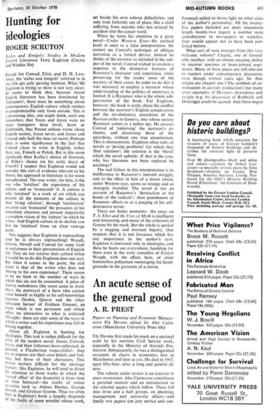An acute sense of the general good
A. R. PREST
Papers on Planning and Economic Manage- ment Ely Devons edited Sir Alec Cairn- cross (Manchester University Press 60s)
Ely Devons first made his mark on a national scale by his wartime Civil Service work, especially in the Ministry of Aircraft Pro- duction. Subsequently, he was a distinguished occupant of chairs in economics first at Manchester and later at LSE. He died in 1967, aged fifty-four, after a long and painful ill- ness.
The volume under review is an exercise in piam memoriam. Alec Cairncross contributes a personal memoir and an introduction to the selected papers which follow. These fall into three and a half groups, on planning, management and university affairs—and finally two papers (on jury service and con-
ferences) added to throw light on other sides of the author's personality. All the twenty- five papers included are short (maximum length twenty-two pages): a number were contributions to newspapers or weeklies; four would appear not to have been pub- lished before.
What sort of man emerges from this very welcome volume? Clearly, one of formid- able intellect, with an almost uncanny ability to uncover specious or loose-jointed argu- ments. Many of these pieces are still relevant to matters under contemporary discussion, even though written years ago. Sir Alec singles out chapter one (The problem of co- ordination in aircraft production') but many other examples of Devons's shrewdness and insight (e.g. his discussion of Redbrick and Oxbridge) could be quoted. And these eslays
bear witness time and time again to his commonsense, his realisation of the need for humility in his subject and his utter impati- ence with exaggerated claims. Along with this powerful searchlight of a mind went a fascination with the principles and practices of power. We find a number of references to the need to pull strings, to manoeuvre and to mampulate in order to make things work better. It must not be thought that this was interest in controlling or influencing organisations for personal aggrandisement, for Devons was imbued with a very acute sense of the general good. The best testi- mony here is the powerful and beneficial impact he had on the institutions which he served in Manchester and London. Finally, there was a playful side to the man; this comes out in the paradoxes in which he de- lighted, though perhaps the best illustration is the gem of an essay at the end, which might well have been entitled how to stay awake in boring meetings'.
Despite all these very real and very sub- stantial gifts, it must be recorded that Devons's contributions to the literature of economics were slender. He never produced anything which could by any stretch of imagination be called a magnum opus; and I would guess that very few of his papers, despite their wisdom and shrewdness, are read by students today—and probably even fewer will be read in another five years' time.
Sir Alec seems to suggest that the main reason for this sharp contrast was the burden of university administration. I wonder; it is very easy to mistake correlation for causa- tion here. My own guess—and I may here have an advantage in not having known Devons well personally—is that the more likely reasons were that he was basically more interested in politics and administration than in economics and that essentially his mind was cast in a critical rather than a creative mould. It is a fair guess that he himself would have endorsed the paradox that it can be a handicap to be too able at too many things,















































 Previous page
Previous page